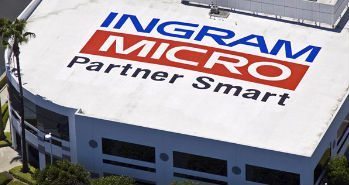Ingram Micro calls itself the world’s largest technology distributor, and as more and more technology involves mobility, the company is clearly positioning itself to dominate mobile device logistics as well. Ingram Micro purchased BrightPoint in 2012 and within a few months launched its Ingram Micro Mobility business. Now it looks like that was just the beginning of the company’s move into mobile.
“The intent is to build up the mobility,” said Bashar Nejdawi, president of Ingram Micro Mobility North America. Nejdawi said that acquisitions are a key part of the strategy. “We at Ingram Micro are going to continue to look at pursuing our strategy of expansion, pursuing our strategy of building up the supply chain services business, strengthening our relationships and the business that we do with national retailers, enterprise and carriers,” he said. “So we will do this organically by growing and we will also continue to look at acquisitions.”
Ingram has made nine acquisitions within the last two years. In addition to BrightPoint, Ingram has purchased Shipwire, a specialist in e-commerce fulfillment and supply chain management, SoftCom, a Canadian provider of web hosting and cloud infrastructure services, and Georgia’s CloudBlue, a provider of enterprise IT asset disposition.
Most recently, Ingram purchased Canada’s Global Mobility Products, a provider of mobile reverse logistics, repair and asset recovery services. GMP serves roughly 3,000 retail locations, and its customers include wireless carriers, retailers and manufacturers. “This is a strong strategic fit, providing us with an immediate corridor to a rapidly growing, high-value services market that directly addresses the needs of mobility operators and retailers in Canada’s large and growing mobility market,” said Nejdawi.
Traditionally, BrightPoint’s biggest competitor in the device logistics space was Brightstar, a company with a similar name and a similar business model. The two rivals competed for customers and employees, but that rivalry is changing somewhat now that both companies have been acquired. About a year after Ingram Micro bought BrightPoint, Japan’s Softbank purchased a majority stake in Brightstar. Softbank of course owns a controlling interest in Sprint as well, so Brightstar now has most of Sprint’s business. But other carriers may be more eager to work with independent logistics partners, and that is good news for Ingram Micro Mobility.
Last month Ingram announced an exclusive sourcing and supply chain management agreement with the 360 Group, a consortium of four of Verizon Wireless’ largest national dealers including A Wireless, Diamond Wireless, Go Wireless and Moorehead Communications. Ingram Micro Mobility will be integrated directly into the point of sale system of each of the 360 Group members.
Nejdawi said there are several parts of the device life cycle that can be made more efficient through effective supply chain management. He said the first part is supply chain management, managing lead times and “making the devices available at the right time from a demand planning perspective … that’s on the forward side which is between the OEM and the retail channel.” The other part of the process is more familiar to wireless customers: device sales and returns. Ingram processes more than 10,000 returned devices every day. Some are disassembled so that the parts can be reused or recycled, and others find new life with a new owner, often in emerging or developing markets.
“There are a lot of devices that get recycled and refurbished and get put back into those markets in a very significant way, and a lot of times those really get under-reported,” said Nejdawi. Many estimates of mobile phone sales tend to count subscribers, not phones, he said. But recycled phones are often sold unlocked and do not go through a measured channel.
Follow me on Twitter.

Beyond BrightPoint: Ingram Micro continues expansion in mobile
ABOUT AUTHOR
